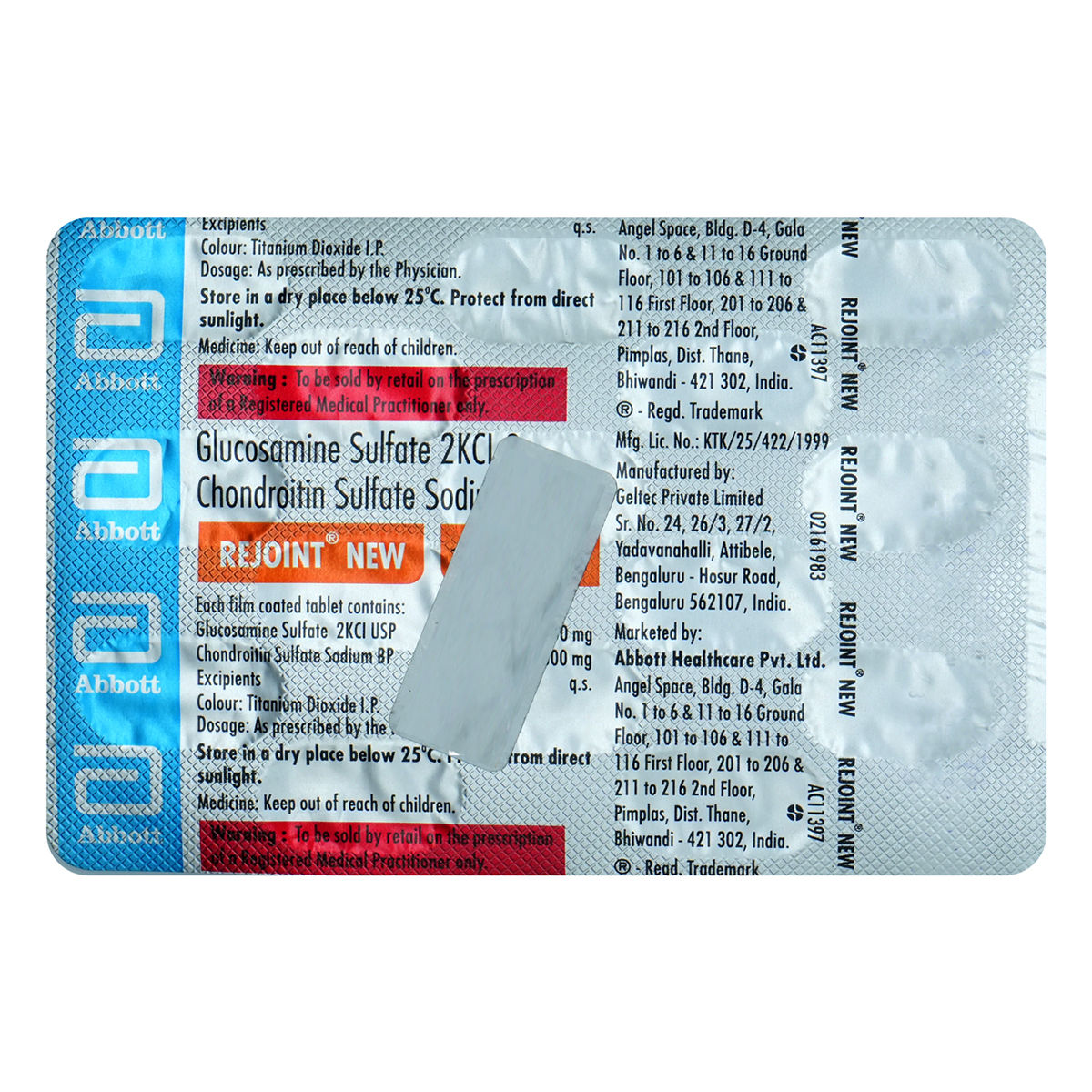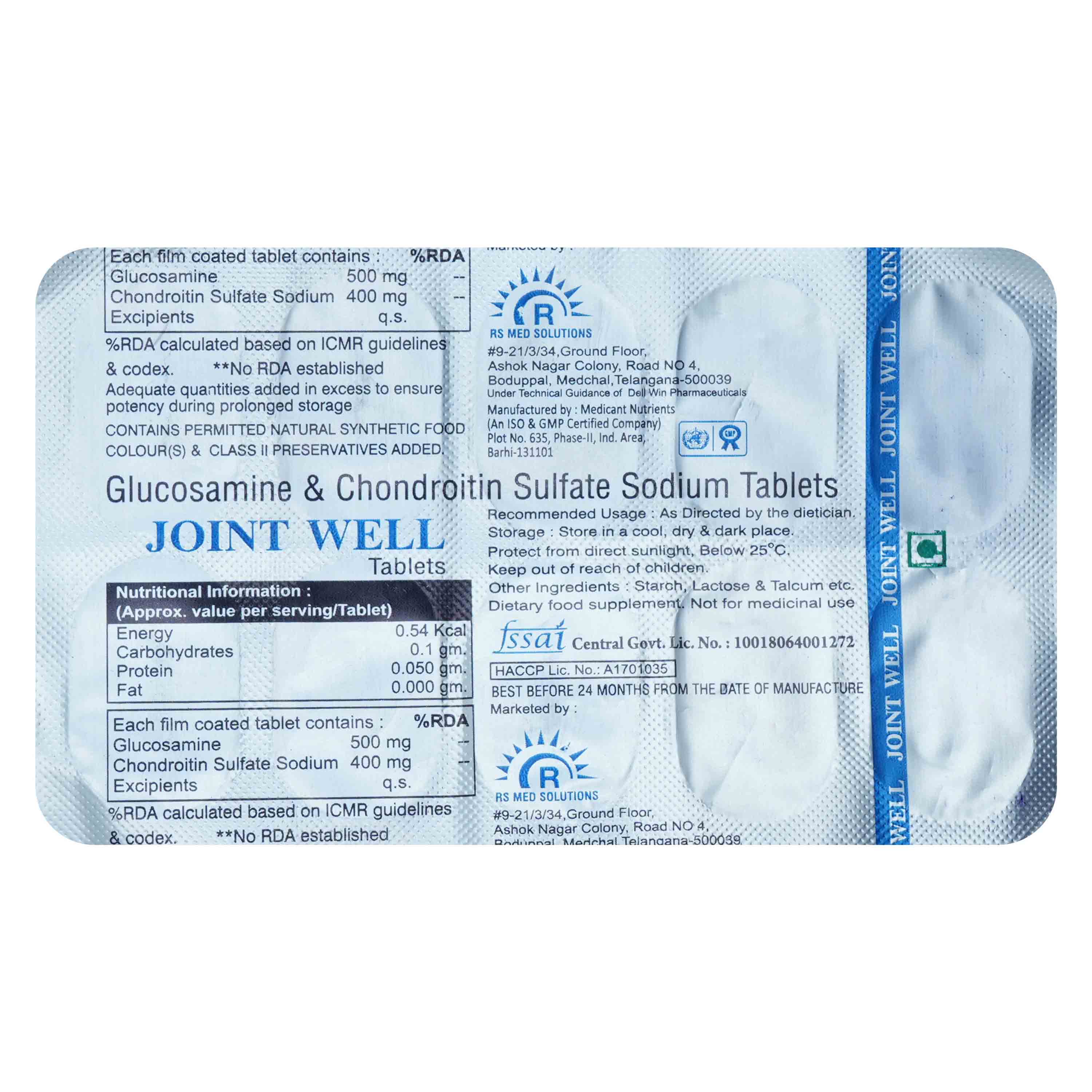Chondroitin
About Chondroitin
Chondroitin belongs to the class of medicine called proteoglycan synthesis stimulators, primarily used to treat osteoarthritis. Osteoarthritis is a joint condition in which the two ends of the joints come together due to the breakdown of a protective covering called cartilage.
Chondroitin contains Chondroitin as an active ingredient, which is a nutritional supplement. Chondroitin restricts the action of a protein responsible for causing inflammation and destruction of cartilage in osteoarthritis. It also provides elasticity. This helps in the formation of cartilage and make the joints lubricated for better movement and flexibility.
Chondroitin may cause certain common side effects, such as headache, tiredness, nausea, abdominal pain, indigestion, diarrhoea, and constipation. Most of these side effects do not require medical attention and resolve gradually over time. However, you are advised to talk to your doctor if you experience these side effects persistently. Take Chondroitin as suggested by your physician or dietician.
Discontinue taking Chondroitin and inform your doctor if you have any allergic reactions. Inform your doctor if you have impaired glucose tolerance, kidney or liver dysfunction, heart disease, or lung conditions. Chondroitin is not recommended for children younger than 18 years. Let your doctor know if you are pregnant, planning to be pregnant, or breastfeeding.
Uses of Chondroitin
Medicinal Benefits
Chondroitin has anti-inflammatory properties that help relieves pain, swelling, and other symptoms associated with osteoarthritis. Chondroitin contains Chondroitin as an active ingredient that restricts the action of a protein responsible for causing inflammation and destruction of cartilage. It also provides elasticity. Chondroitin relieves pain, thereby improving joint function and helping individuals restore their quality of life. It also increases the cushioning and lubrication of joints.
Directions for Use
Storage
Side Effects of Chondroitin
- Nausea
- Diarrhoea
- Headache
- Tiredness
- Indigestion
- Constipation
- Abdominal pain
- Flatulence
Drug Warnings
Avoid taking Chondroitin if you are allergic to any of the components. Before taking Chondroitin, inform your doctor if you have any history of kidney or liver dysfunction, heart disease, lung disease or asthma. Consult with your doctor if you have blood clots or circulation problems in your legs. Also, let your doctor know if you are pregnant, planning to be pregnant, or breastfeeding. Chondroitin is not recommended for use in children as the safety and efficacy are not established.
Drug Interactions
Drug-Drug Interactions: No interactions found
Drug-Food Interactions: No interactions found.
Drug-Disease Interactions: No interactions found.
Drug-Drug Interactions Checker List:
Safety Advice

Alcohol
consult your doctorIt is unknown whether Chondroitin interacts with alcohol. Please consult your doctor.

Pregnancy
consult your doctorPlease consult your doctor if you are pregnant or planning for pregnancy before taking Chondroitin.

Breast Feeding
consult your doctorPlease consult your doctor if you are breastfeeding before taking Chondroitin.

Driving
cautionIt is not known whether Chondroitin affects your ability to drive. Drive or operate machinery only if you are alert.

Liver
cautionIf you have liver problems, consult your doctor before taking Chondroitin.

Kidney
cautionIf you have kidney problems, consult your doctor before taking Chondroitin.

Children
unsafeChondroitin is not recommended for children below 18 years as the safety and effectiveness have not been established.
Habit Forming
Diet & Lifestyle Advise
- Turmeric and fish oils can help in reducing inflammation in the tissue.
- Please do not go for heavy exercise as it may increase your joint pain in arthritis. Instead, you can do stretching and low-impact aerobic exercises like walking on a treadmill, bike riding, and swimming. You can also strengthen your muscles by lifting light weights.
- Include fish like salmon, trout, tuna, and sardines. These fishes are enriched with omega-3 fatty acids that contain the minimum level of a chemical called cytokines, which ramp up inflammation.
- To achieve the best results, it is strongly recommended to remain physically active as much as your condition allows.
- Adopting a healthy lifestyle coupled with a high-protein diet is the mainstay of managing arthritic conditions.
Special Advise
Patients Concern
Disease/Condition Glossary
Osteoarthritis: Osteoarthritis is a joint condition in which the two ends of the joints come together due to the breakdown of a protective covering called cartilage. It causes friction between the bones leading to wear and tear (damage) of the joint tissues. This disease can occur in any joint, but commonly affected areas of the body are hands, fingertips, knees, hips, spine, typically at the neck or lower back. The most common osteoarthritis symptoms include pain, tenderness (discomfort when pressing on the area with fingers), stiffness, and inflammation.
FAQs
Chondroitin is used to treat Osteoarthritis.
Chondroitin helps in the formation of cartilage (the soft tissue that cushions the joints) and make the joints lubricated for better movement and flexibility. Chondroitin relieves pain, thereby improving joint function and helping an individual restore their quality of life. It also increases the cushioning and lubrication of joints.
If you have glaucoma, inform your doctor before starting Chondroitin. Your doctor may advise regular monitoring of intraocular pressure while taking Chondroitin.
Taking Chondroitin with blood thinners like warfarin may increase the risk of bleeding. Talk to your doctor if you are on blood thinner medications.

.jpg?tr=q-80)



